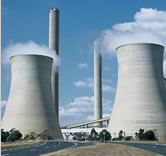May 4 2009
Scotland, which has just issued a report extolling its potential for carbon capture and storage, should hold off on constructing any new coal-fired power stations until carbon storage becomes a reality, WWF-Scotland said last week.
 The government study notes that “evidence for climate change and its potentially catastrophic effects on the world is becoming clearer year on year.” © WWF-Canon / Tanya PETERSEN
The government study notes that “evidence for climate change and its potentially catastrophic effects on the world is becoming clearer year on year.” © WWF-Canon / Tanya PETERSEN
The government study, Opportunities for C02 Storage Around Scotland, notes that “evidence for climate change and its potentially catastrophic effects on the world is becoming clearer year on year.”
The study’s authors conclude that “Scotland has the geology and the motivated and innovative skills base required to deliver a major CO 2 storage industry that will benefit both the Scottish economy and the world's environment.”
Authors of the study, however, note that further research is needed to determine the feasibility of implementing carbon capture and storage (CCS).
"Whilst carbon capture is no silver bullet, it has the potential to play an important role in the global effort to cut carbon emissions,” said Dr Dan Barlow, Head of Policy at WWF Scotland.
"The report identifies many issues that are yet to be resolved. Whilst we need to move forward quickly to progress this technology, the Scottish Government should rule out building any new coal fired power stations until carbon capture is proven and can be applied to a power station from the outset.
“Moving swiftly to demonstrate how well this technology works using Scotland's existing power stations would be an important first step.”
"With power stations responsible for a significant proportion of our climate emissions ending the use of unabated coal or gas power stations will be critical in helping Scotland meet its future climate targets alongside maximising Scotland's huge renewable energy potential and improving energy efficiency."
The study found Scotland has the ability to safely accommodate industrial emissions generated in Scotland and North East of England for the next 200 years and its offshore storage capacity for carbon emissions is greater than the Netherlands, Denmark and Germany combined.
Developing carbon capture and storage in Scotland would also open up real economic opportunities in developing storage hubs and pipeline networks for Europe.
But the study also said there was a need to fund CCS demonstration using EU and other funding
WWF-UK said in a report last year that there could be a role for CCS in the power sector if technology is demonstrated to be effective and transport and storage can be shown to be safe and environmentally benign.
But the report Evading capture: Is the UK power sector ready for carbon capture and storage? was highly critical of an emerging practice for power station proposals for advancing dubious claims that the stations would be “CCS ready”, finding that little of any substance lay behind such claims.
Scotland’s parliament is currently considering a draft climate change bill, which WWF would like to see strengthened with the addition of a legal framework to require the reduction of Scotland’s greenhouse gas emissions by at least 80% by 2050, statutory annual targets for at least 3% cuts in emissions year on year to achieve such a reduction and the inclusion of greenhouse gas emissions from international aviation and shipping.